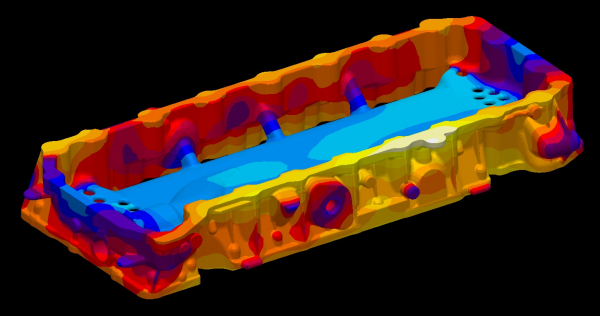Magma Casting Simulation
As a key component part of our Product Launch process, our simulation analysis tools offer a virtual test field for the reduction of casting defects with high degrees of freedom without production risk.
Starting with a “natural solidification” analysis that identifies areas that will present solidification challenges, then we will continue with a preliminary gating / riser system design. After some iterations are run, we are able to refine the model and the process parameters.
Utilizing the methodology of virtual Design of Experiments (DOE) and Autonomous Optimization, robust process parameters and optimized casting layouts can be established before even starting the tool build.
The analysis starts with the optimization of the gating system. The early detection of potential filling defects, like air-entrapment, turbulence or oxide formation; permit the development of a better gating system. The use of Design of Experiments (DOE) or Autonomous Optimization allows LSI to setup one time, simulate many designs and assess once to find the optimal design in a shorter period of time.
Then, LSI continues with the solidification studies. The knowledge of temperatures and solidification behavior leads to a quantitative prediction of the local thermal modulus in the casting, the prediction of hot spots, areas of final solidification, as well as cooling rates, solidification times, temperature gradients and shrinkage porosity defects. The proper riser/feeding system is designed and optimized.
Finally, using the final gating and feeder systems, depending of the particular casting process, the tooling supplier starts the build of the new mold.
When the final tooling models are completed, a confirmation run is made. Every new project is analyzed. A correlation study is made, comparing the casting results versus those predicted. If there are discrepancies, the simulation model is updated. Then, when a new project is analyzed, a new updated simulation program is in place and it takes advantage of the previous correlation studies.
LSI uses simulation tools extensively for each product development, and we collaborate with MAGMA Inc. to improve the software.
Each of the manufacturing processes at LSI can be simulated. Sand Mold, Permanent Mold Tilting, Permanent Mold Low Pressure and Die Casting.
Today’s requirements on the development of an aluminum casting demand methodologies and tools which allow a maximization of process robustness and profitability at the earliest possible point in time.
Le Sueur Incorporated specializes in producing dimensionally complex, pressure tight aluminum castings and thermoplastic injection molded components. We offer complete in-house precision machining, finishing and assembly. Please contact us to learn more about our capabilities and discuss your casting project!



